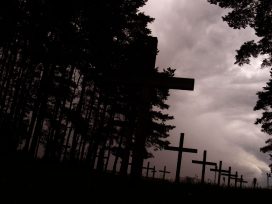The eternal angst
What is a human being? The question is eternal and remarkably similar to the title of Primo Levi’s If This Is A Man (1947), based on his experiences in Auschwitz. Not only is the validity of the question eternal, but the question itself is becoming increasingly acute. A human being is more than a conscious body; she is more than an isolated unit with clear boundaries. Rather, her boundaries are vague and negotiable. A human being is exposed to external influences such as communication, propaganda and upbringing. She can be subject to chemical, biological and even genetic manipulations. She is, of course, a discrete unit in the sense of being an individual, but she is also connected to other humans and to other animals, and, by extension, to an ecological and social context, without which what it means to be human would be very different.
The fragility of the human being and her susceptibility to external influences is an old insight, discussed in the very earliest texts of western civilization, such as Hippocrates’ On Airs, Waters and Places from ca. 400 BC, by several of the ancient moral philosophers, and of course in the Bible. Her twofold nature, to both have contact with the material world through her body and with the spiritual or intellectual world through her soul or thoughts, is a central element in western dualism. Variations on this theme also exist in other religious and intellectual traditions. In Pico della Mirandola’s classic fifteenth-century text Oration on the Dignity of Man, the idea is formulated as a moral and existential choice that God presents to human beings: “I have placed you at the very centre of the world,” God says to the human, leaving her to choose whether to embrace her longing for God and goodness, or surrender to her animalistic impulses and be “dedicated to his stomach, crawling on the ground”. Even Aristotle addressed the idea of a scale in nature, placing humans at the intersection between the divine and earthly by virtue of their soul.
Some scholars in philosophy and science do recognise this complex image of human nature. There is, however, an undeniable tension between the ancient insight into the composite nature of human beings and some of the cornerstones of western modernity. Mainstream economic thought assumes that we strive to materialize our own personal well-being. Politically, we are assumed to express our personal interests through political choices, which to some extent make us part of social groups and classes, but it is held that the basis of our choice is what is beneficial for us as individuals. Jurisprudence has developed a sophisticated model to deal with everything that has to do with individual matters: individual rights and duties, individual criminal responsibility, private property rights.
The image of the modern human being as unique and discrete, separated from all other beings, has emerged from more and more academic disciplines and has developed lock step with liberal capitalist societies. If past societies seem one-dimensional from our modern perspective because of their lack of appreciation for individual freedom and integrity – seen for example in the existence of clans, patriarchy, religious coercion – it is possible that a visitor from a different epoch to our present society would be surprised at our ability to find ways of making people independent of each other. This visitor might even note that the Swedes, in particular, have developed an unusually advanced and subtle interpretation of individualism, protected by extensive public commitments that relieve them from personally engaging in the care of their fellow people and collective concerns.
Recently, culture, in particular popular culture, has formulated vivid images of this human being. Trapped within herself and her doctrinal solitude, she cannot cope with the life that is expected of her in terms of working, buying, commuting, being entertained by the media and so on, in a soul-destroying cycle of monotonous repetition. Among the many films and books that portray these breakdowns, the 1993 film Falling Down starring Michael Douglas, or the short but intense 1980’s novel Bright Lights, Big City by Jay McInerney, immediately spring to mind. The theme is not, however, novel, and can be found in the writings of early sociologists such as Émile Durkheim and Georg Simmel, post-war philosophers such as Max Horkheimer and Theodor Adorno, and it re-occurs in novels throughout most of the twentieth century in the portrayal of the alienation and frustration among men without qualities, from Robert Musil to Jerzy Kosinski. The theme can also be found in the writings of more recent social scientists such as Robert Putnam, who argues that we are increasingly “bowling alone”.
This existential and social frustration has by no means ceased; it has, rather, accelerated and does not surprise us anymore. It is treated as a constant in modern existence, as fundamental as the paradoxical “stress” that most people have a personal interest in maintaining to defend their position in the production line, at the same time as it seems to undermine health and wellbeing.
However, the doctrine of the self-obsessed individual has been challenged from various positions. Research in health and psychology shows that we are people who need relationships and connections, from friendships and networks, to lead long and healthy lives, indeed to survive. Even economic research, particularly in the expanding behavioural economics, is increasingly alienating itself from the image of the rationally singular homo economicus. It doesn’t seem as if a reserved, distinct and determined individual detached from her surroundings can exist, and the ones who do attempt it appear to be doomed.
In a similar way, the image of the human being isolated from nature has changed. An image of the modern human as interconnected with the surrounding natural environment has emerged instead. During the past century, the boundaries of mankind have been expanded to include practically the whole planet, which, in turn, has been transformed for our purposes. Furthermore, we now have access to a well-developed vocabulary and a number of fairly well-explored indicators. “The ecological footprint” is a way of determining the size of “ghost hectares” (an expression with similar connotations, “ghost acreage”, was used decades earlier by the Swedish food researcher Georg Borgström) needed to keep a human being alive, or a city or nation at a certain standard of living. This footprint is growing and the expansion does not seem to be diminishing, even if “ecological efficiency” has marginally increased the return per unit area. Researchers have attempted to calculate how far we can stretch the boundaries of earth before we reach dangerous conditions.
Some of these “planetary boundaries” have already been exceeded many times over; others will be in the near future. This research also has a prehistory, which tells us about resources and conditions for the survival of humankind and states. A central thought that dates from the early days of statistics is Staatenkunde; this literally meant to compile an inventory of the assets that a state and its prince had at their disposal to gain prosperity, keep order in their country and win wars against their enemies. In Britain, this was called political arithmetic. During the nineteenth century, the effects of economic expansion on the landscape became more obvious. Interestingly, this happened at about the same time as the development of thinking on the negotiable boundaries of the human being. This was largely a result of Darwin’s work, which toppled mankind from the pedestal of being made in the image of God and pointed out instead her animalistic characteristics, arguing that evolution has made us to who we are. (This should not, however, be taken to mean that biology is simple and morally prescriptive.) Ecology has also moved the boundaries and reach of mankind, which can be seen as an expansion of the Darwinian tradition – summarised by Darwin in one of political history’s most beautiful formulations: “we may be all netted together” – at a larger and ultimately global level.
Interestingly, Ernst Haeckel, the German zoologist, author and artist, who launched the idea of ecology and coined it as a concept, was also an enthusiastic Darwinian. What Haeckel and the emerging discipline of ecology, primarily during the twentieth century, did was to describe the relationship between all living entities including human beings. From the fringes of nature and the living as a grand collectivity, it is thus a borderless being that enters the modern world and begins to challenge the notion of a human being with distinct boundaries. Ecology, like some areas of sociology, is about dependence and interaction, about conceptualizing a human being who extends beyond the limits of its body and is part of a larger whole in which its engagement is vital.
Intimate relationships
In the course of the twentieth century, a rich, but in conventional contexts mostly neglected, political and philosophical tradition formulated an understanding of this new human being. It posited much more negotiable boundaries between “oneself”, the sensitive inside consisting of organs and movable genes, and the outside, necessary for survival, consisting of an environment and nature that support one’s whole existence.
We need only a few snapshots to get some idea of the shape of this history. One example is the development of demography during the interwar period, and the concept of a fundamental conflict between population growth and limited resources. Another concerns the very nature of Earth’s crucial life-sustainable conditions. A crucial work is Biosfera, published in 1926 by the Russian biochemist Vladimir Vernadsky, who coined the concept “biosphere” and clarified the relationship between the thin membrane of the living and the fragility of human civilisation. Drawing on applied mathematics, Vernadsky’s systems ecology showed with simple but convincing flow charts how mankind’s production and consumption was part of a much larger natural system regulated by principles of nature. Much later, in the 1990s, this idea developed into the idea of “ecosystem services”, which is now prominent in fields as diverse as natural resources management, public health, and urban planning. Increasingly, findings in psychological research also show that the simple behaviouristic understanding of human nature as stimulus-response driven is insufficient; the mental health of a human being is dependent on networks of people, for whom she also has responsibility, while emotional dependency also exists in relationships to pets and other living beings.
During the latter part of the twentieth century and the beginning of the twenty-first, more and more evidence was presented in support of a common origin for the human race and a shared pool of DNA from the pre-history of the species in Africa. Even if we were individuals, and over time had been split into languages, nations and classes, we ultimately shared a common origin. We belonged to the same species and were therefore connected. Philosophically there was a greater resonance with earlier ideas of one mankind with shared roots and common interests. The connections between humans, nature and globalisation has recently been increasingly emphasised in research and historiography. Some examples are the 1948 United Nations Declaration of Human Rights and the recent and vastly growing literature about a vulnerable earth with a set of common problems, such as Farfield Osborn’s Our Plundered Planet and William Vogt’s The Road to Survival (both 1948), and various others in a similarly concerned, sometimes pessimistic, and often crucially neo-Malthusian genre.
A central concept in this narrative about a united humanity with a common destiny is oikumene, which was recognised by Pope Paul III in 1537, after the extensive debates about the cruelties in the New World, and whether those killed by the Spaniards actually were human beings with the same rights as Europeans. According to the bull Sublimis Deus, these individuals deserved the same papal attention and should not be considered to be savages, bruta animalia. The Indians were not born solely to serve, but were real human beings, vero homines, who could be converted to Christianity.
The idea of a single humanity grew gradually and gained recognition during the seventeenth and eighteenth centuries. Locke spoke about humanity in general terms and described the seas as “that great and still remaining common of mankind”, but without ever compromising his fundamental conviction about the individual’s right to prosperity and self-defence. Rousseau was certain about the hypocrisy in the then current language and claimed that “The entire earth is covered with nations of whom we know only their names, and we are meddling with judging the human race!” Humanity must be an all-inclusive concept above nations and individuals, and to achieve this all the peoples in the world must be examined and described.
Montesquieu, despite his interest in differences, blamed his predecessors Pufendorf and Grotius because they had neglected to expand the rights they had ascribed the free men to the slaves. Johann Gottfried Herder spoke about mankind as “a single family on a planet that is not very big”. He also predicted, more than 200 years ago, that mankind would not leave any corner of the world untouched. The idea of a shared history of mankind is even more explicit in the writings of Thomas Paine, who concluded in his Rights of Man (1791) that there was agreement in all accounts of the creation on “the unity of man; by which I mean, that men are all of one degree, and consequently that all men are born equal and with equal natural rights”.
It might seem a deviation at this point to recall what could be called the history of ideas and science of “humanity”, but it is necessary. The natural world and the planet that is now under such intense discussion, is a part of humanity and its destiny.
It is, therefore, possible, as suggested above, to describe the history of the past two centuries in terms of an increasing tension between these images of humanity and her boundaries. On the one side of this tension stands the modernist view of the individual whose influence is limited by the constraints of the body, with rights and responsibilities, whose freedoms should not be infringed and whose actions should not be hindered, without any consideration or even awareness of contextual interdependence. On the other side, there is the emerging scientific view of a human being strongly interconnected with and dependent on others and the natural world.
Expanding the boundaries, establishing responsibility
Michel Serres and Donna Haraway, both eminent writers on the subject, argue that the boundary between humans and nature plays a crucial role in creating this tension. Serres’ starting position is his book Le Contrat Naturel, where he examines from a philosophy of rights perspective the foundations of the great transformation he considered himself to be witnessing on a planet where the powers of nature would soon be trumped by the accumulated human impact. In this situation, mankind must cease merely to attempt to defeat its eternal “nemesis” nature and attempt instead to act as a representative for all nature, ultimately taking responsibility for her own long term prosperity.
For Serres, the boundaries of humanity are in the first instance expanded by her impact on nature, then further by her entering a relationship with, and taking responsibility for, the impact she has on nature and, finally by her realising that this responsibility is not local but global and that all humans, however local and individual, are thereby united in one humanity with the same planetary interest. In a way, for Serres, the earth and humanity collide into one entity, becoming both subject and object; their destinies are intertwined. The concept of “scale” is crucial for Serres. As the impact on the environment increases, and trade and resource flows expand over greater areas, the scale of the relevant human responsibility increases accordingly.
However, as with all change of scale, globalisation transforms, progressively and profoundly, the status both of objects as well as subjects in a process that increases action and knowledge towards the universal.
Hidden behind this rather perplexing formulation, one can find a perspective on world development. In short, it claims that mankind, through its establishment of even larger “objects” in order to control the world – knowledge, technological systems, infrastructure – gradually transforms earth to an object and thereby, as subject, will inhabit its own creation and transform all of its residents to subjects in the legal sense. In a way, Serres belongs in the long tradition that began with Bartolomé de las Casas, who, in the sixteenth century, argued for the rights of the Indians in the Caribbean. The ethical sphere, which is also political, has been expanded to include not only free men, but also the working classes, women and children. Now, according to Serres, it is the turn of other living beings and why not nature in its entirety. The longstanding division between humans and nature, or subject and object, has to be renegotiated. The person who does this is thus a human being who, as a member of mankind, embodies her environment and takes responsibility for it as something that is not part of a different reality but a different part of the same reality. An expression by the Spanish philosopher José Ortega y Gasset from Méditationes del Quijote springs to mind: “Yo soy yo y mi circumstancia”: “I am myself and my circumstance, and if I do not save my circumstance, I cannot save myself.”
If Serres follows the expansion of the boundaries of mankind outwards, towards the planetary, then Donna Haraway follows the same movement inwards, towards genetic codes and the behaviour and interaction of individuals. She is interested in living beings in the proximity of humans: pets, dogs and cats especially, but also herding and anthropomorphic animals, and has devoted considerable time researching them, partly as a biologist but mostly as an explorer of how natural science has developed, particularly in studies of primates. In a deliberate paraphrase of Bruno Latour’s familiar expression, “We have never been modern”, Haraway suggests that “we have never been human”, meaning that the boundary between animal and human is exaggerated and essentially socially constructed. Humanity is, in fact, something that also extends to the world of animals, or rather the animal kingdom extends far into the human.
Such a trans-boundary ontology has essentially been impossible to conceive in the western tradition outlined above. Current thought is different, presumably because animals have become part of the object (“nature”) that we, according to Serres, are taking more responsibility for. Sensitization to the suffering of animals has its own history, and was in western tradition first discussed in earnest in the eighteenth century and expressed most eloquently in Jeremy Bentham’s dictum: “The essential question is not whether animals can speak or think but: ‘Can they suffer?'”
Haraway notes that it is by no means only theologians and economists who stand in the way of an expansion of the notion of a united humanity with a planetary and sustainable responsibility for all living beings. Even philosophers have counted themselves among humanity’s self-elected vanguard. Here Haraway uses what already seems likely to become a trope in the animal-human literature. Her example is taken from a lecture given by Jacques Derrida. The experience of standing in the shower being observed by his cat sparked off a reflection on the cat’s potential thoughts about his nudity. Haraway notes that Derrida assumes an understanding of nudity that the cat cannot possess.
In her book What I Don’t Know about Animals, the British author Jenny Diski reiterates the same situation with Derrida in the shower with his cat. However, citing Wittgenstein, who concluded that even if a lion could speak we would not understand it because we would not be able to speak “lionish”, Diski shows that not all philosophers are as cerebral and blinded by their speciesism as Derrida. To understand the words and grammar would not be enough because the contexts that give meaning, which are the very point of speech, would be unknown to us. Besides, the cat probably just wanted to be let out of the bathroom – or had seen something of an appropriate size to play with.
The two texts by Serres and Haraway, with their profound insights into modern biology, show the on-going renegotiation of the fundamental concepts of the human, humanity, nature and, indirectly (the word is hardly mentioned in the texts), the environment. The fact that this redefinition is happening in itself indicates that we are moving further into an epoch in planetary development that natural scientists call Anthropocene, because mankind (anthropos) is now the dominant factor impacting even geology.
Texts like these foreshadow the contours of the politics that mankind might want to consider in a few generations. An optimistic interpretation is that they represent, both from the first decade of the twenty-first century, what the texts of Ortega y Gasset and Vernadsky from 1914 and 1926 meant for the UN’s declaration of human rights in 1948, the UN conference “One World” in Stockholm in 1972, or the Kyoto protocol in 1997 – perhaps with a similar delay. Indirectly they are telling us that the future also needs politics.






